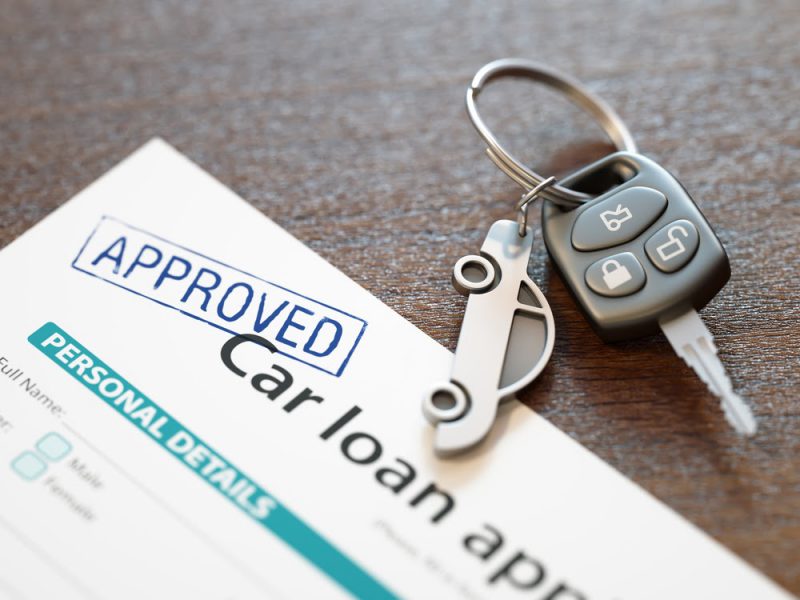Sometimes a personal loan requires you to provide collateral to help qualify for the loan amount you’re seeking during the application process. With an auto-secured loan, you can obtain a loan using your car as collateral for the cash you need. Regional Finance offers some of the best loans using a car as collateral, giving borrowers flexibility to cover their expenses.
Putting up your car as collateral for a loan can get you quick cash, but it also puts your vehicle at risk. It’s important to understand exactly how auto collateral loans work and weigh the pros and cons before moving forward.
With a car title loan, also called a auto equity loan, you use your paid-off car as collateral to borrow money. The lender places a lien on your car title in exchange for the loan If you stop making payments, the lender can repossess and sell your car to recoup their money
These types of loans appeal to borrowers with bad credit or an urgent need for cash. But the steep interest rates and risk of losing your vehicle make them one of the most expensive loan options. Before committing to a auto collateral loan, learn how they work and carefully consider alternatives.
How Do Auto Collateral Loans Work?
Car title loans share some common traits:
-
You must own your vehicle free and clear with no existing loans. Loans are available for cars, motorcycles, RVs, boats, and other vehicles.
-
The lender determines the maximum loan amount based on the car’s value, typically lending 25% to 50% of the car’s worth. Older cars qualify for less.
-
Interest rates are very high, often exceeding 200% APR. You’ll pay the interest monthly with the principal due at maturity.
-
Loan terms are usually 30 days to one year. Longer terms have lower payments but higher interest costs.
-
If you default, the lender can repossess your car and sell it to cover their losses. You’re responsible for any deficiency.
-
Lenders rarely check your credit. They focus on the car’s value rather than your finances.
-
You must continue insuring, registering, and maintaining the car during the loan.
To get a car title loan, you’ll provide proof of income, vehicle ownership, and insurance. The lender will appraise your car and offer loan terms. If approved, you’ll provide the title as collateral and get your funds.
The Pros of Car Title Loans
These fast cash loans do come with some potential benefits:
Easy to qualify: Lenders emphasize your car’s value over your credit scores or income. If you own your car free and clear, approval is pretty likely.
Fast funding: Many lenders provide same day funding once approved. This makes car title loans useful for covering emergency costs.
Keep driving your car: As long as you make your payments on time, you get to keep possessing and driving your vehicle.
No restrictions on use: Cash from a car title loan can be used for any purpose, unlike a car purchase loan.
May improve credit: If you make all your payments on time, an auto equity loan shows potential lenders you can handle debt responsibly.
Lower payments: Longer loan terms of 12-24 months have more affordable monthly payments than short-term loans.
The Cons of Auto Collateral Loans
However, there are also considerable downsides to putting up your car as collateral:
Sky-high interest rates: Expect interest rates of 100% to 300% APR. That’s significantly higher than alternatives like personal loans or credit cards.
Risk of repossession: Your car can be repossessed quickly if you fall behind on payments. Many lenders don’t offer grace periods.
Fees and penalties: Defaulting on your loan often triggers fees for late payments, collection, repossession, and more. They add up fast.
Short terms: Even 12 or 24 month terms are short compared to 60+ month car loans or 30 year mortgages. Short terms mean large payments.
Lenders prioritize profits: Lenders make more money repossessing your car than working out affordable repayment plans with borrowers.
Doesn’t improve finances: While these loans provide fast cash, they don’t help you get on steadier financial footing. Interest costs eat away a lot of the money borrowed.
Other loan options: Personal loans, credit cards, and pawning valuables can provide funds without putting your car at risk.
What Are the Interest Rates on Car Title Loans?
Car title loan interest rates are notoriously high:
- Average APRs range from 100% to 300%
- For a 30-day, $1,000 loan, expect $100 to $250 in interest
- Monthly interest rates range from 5% to 25% of the principal
The state you live in impacts rates too. States with no rate caps see APRs over 300%. Other states limit rates to as low as 36%. Shop around within your state for the best deals.
Also note that advertised rates are often “monthly” rates. Multiplying that rate by 12 converts it to the higher annual rate. Don’t get tricked by misleading rate advertising.
How Much Can You Borrow with a Car Title Loan?
Loan amounts depend on your car’s resale value, mileage, condition, and year. The more valuable your car, the higher the potential loan amount.
Typical loan-to-value ratios lenders use are:
- Up to 50% of resale value for newer cars
- Up to 25% for older cars over 10 years old
- Minimum loans of 25% of blue book value
With a car valued at $10,000, you may borrow $2,500 to $5,000.
Super high-end luxury or classic vehicles can qualify for up to $100,000 in some cases. But average loan amounts range from $1,000 to $5,000 for most borrowers.
Can You Get a Car Title Loan Without a Title?
No, the car title is the collateral that secures the loan. Without a title in your name proving sole ownership of the vehicle, lenders will not provide loans.
Some situations where you won’t have the title that’s needed:
-
You’re still making payments on your car loan. The lender holds the title until you pay off the loan.
-
The car is leased rather than owned. The leasing company holds the title.
-
The car is jointly owned with another person. Both names must be on the title.
-
You only have the bill of sale but no title yet.
-
The physical title document is lost, even if you fully own the car.
In these cases, you’ll need to resolve any issues and get the title in your possession before a car title loan is possible.
Step-by-Step Guide to Getting a Car Title Loan
If you decide a car equity loan is your best option for fast cash, here are the steps to get one:
-
Find lenders – Search online and visit local stores. Compare interest rates and loan details.
-
Check eligibility – You’ll need a clear car title, valid ID, and proof of income and insurance.
-
Complete the application – At the lender or online. It only takes a few minutes.
-
Get approved – The lender verifies your documents and vehicle value. This usually takes less than one hour.
-
Provide your car title – Sign it over to the lender as collateral for them to hold during the loan term.
-
Get your cash – The loan amount will be distributed to you or deposited into your bank account.
-
Make payments – Repay the monthly interest plus principal at maturity. Don’t be late!
-
Get title back – Upon paying off the loan, the lender returns your car title.
6 Critical Questions to Ask Yourself First
Car title loans can cause financial distress if used incorrectly. To make sure it’s the right move, ask yourself:
-
Is this loan absolutely necessary right now? Are there cheaper alternatives?
-
Can I afford the monthly payments, or will it cause a strain?
-
What is my plan for repaying it in full when due?
-
What is the impact if my car gets repossessed? Do I have other transportation options?
-
Does this lender have fair rates, fees, and repayment terms? Have I compared lenders?
-
If I lost this car, could I replace it without needing another title loan?
If you’re uncertain on any of these questions, a car title loan may be too risky for your situation. Explore other possibilities first.
Alternatives to Auto Collateral Loans
Before resorting to your car title as collateral, exhaust other possibilities:
-
Borrow from family or friends – For no fees and interest, if possible.
-
Traditional loans – Bank and online lenders offer personal loans with lower rates.
-
Credit cards – Max out cards or take a cash advance in a pinch.
-
Government assistance – Nonprofits and public programs offer affordable financing.
-
Loan modifications – Ask existing creditors for extended payment plans.
-
Sell assets – Generate cash quickly by selling valuables you own.
-
Paycheck advance – Some employers provide paycheck advances in emergencies.
While not perfect, these options are likely to cost a lot less than a car title loan.

Auto-secured loans and peace of mind are a package deal here.
At Regional Finance, we strive to make your auto-secured loan process as easy as possible from the very beginning to the very end.

Unlike credit cards with changing payments and rates, with Regional Finance you’ll know your exact monthly payments.
At Regional Finance, we make sure you’ll know how long it will take to pay off your loan and when it’s time to make payments.
Fast and easy payments give you more time to enjoy what’s important to you. Friendly, quick solutions are what we’re all about.
Frequently asked questions about auto-secured loans What is loan collateral?
Collateral is something of value that belongs to you that you agree to give your lender should you fail to repay your personal loan. The lender can then sell that item to recover the unpaid portion of the loan. What do I need to get an auto secured loan?
First and foremost, you’ll need a vehicle that you own to get an auto-secured loan, such as a car or truck. Remember, when using a truck or car as collateral for an auto- secured loan, it must be adequately insured before it can be accepted for your loan. Additionally, your vehicle must meet certain collateral guidelines. Your local branch can provide more information on these. Why do I need collateral to secure a personal loan?
Offering collateral for a personal loan can improve your chances of being approved for a larger loan amount and can potentially get you a lower interest rate than an unsecured loan. Getting a personal loan with your car as collateral could also be a better option for those with a less-than-perfect credit score. Is a Regional Finance auto-secured loan different than other car title loans?
Some auto title loans can operate like payday loans with triple-digit interest rates and short terms which can make it hard to pay off. Regional Finance provides fixed rates and may provide longer repayment periods.
We’re more than a personal loan company. Our goal is to help our customers get the money they need to get back on track and provide support along the way.
Read independently collected reviews from over 1,500 real customers across the nation and see why so many are saying that Regional Finance is the best place to get a personal loan.
How To Use A Car As Collateral For Loan (How To Get A Loan Using A Car As Collateral)
FAQ
Is it risky to use your car as collateral?
How to borrow money against your vehicle?
Can I use my car as equity for a loan?
Can I use the car I’m buying as collateral?
